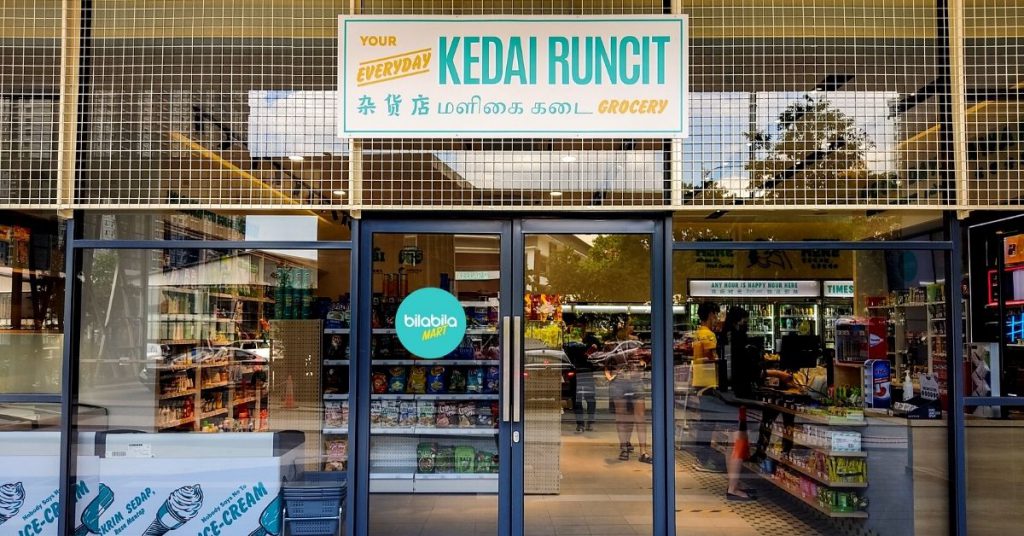Convenience stores are on the rise in the country, most notably of foreign brands like Japanese and Korean ones, which are trending recently.
“You see FamilyMart from Japan, 7-Eleven from the US, but we don’t have any homegrown Malaysian convenience stores that sell Malaysian brands and products,” the BilaBila Mart team claimed in an interview with Vulcan Post.
Wanting Malaysia to have their own homegrown convenience store, the team built BilaBila Mart, a modern kedai runcit housing Malaysian-produced groceries.
“We’ve always been a fan of local brands selling on Instagram and wanted to make it more affordable for them to get their products on the shelves of convenience stores,” they explained.
Giving local brands visibility they can afford
BilaBila Mart was founded by 3 friends who have backgrounds in sales and marketing, finance, accounting, banking, and investments.
They realised that the listing fee brands have to pay to get on the shelves of convenience stores wasn’t cheap, which was a hindrance to local brands’ visibility. Their solution? Get rid of the listing fee, and earn instead from profit-sharing with the brands only.
“The percentage of profit split is on par with the industry’s practice, and some even lower as well,” they disclosed.
Currently, they have over 100 local brands listed in their store, but the BilaBila Mart team has some foreign goods on their shelves too. Local brands take up 70% of the space whereas the other 30% are foreign brands.

Landing a spot on their shelves
To be in BilaBila Mart, a brand must be able to present itself well. What they mean by this is, for instance, the product has to be visually appealing, and it should have ample nutrition and product information on its packaging.
Additionally, the product should also have a barcode and be HACCP certified, showing that it meets food safety standards. An example of this would be a local brand we covered previously, 3AM Coffee, that meets the BilaBila team’s standards of deciding which local brands to put on their shelves.
There is also no contract period for how long a brand can list itself on BilaBila Mart’s shelves. Some of the OG brands that have stayed with them since the start include startups like WonderBrew, Wild Kombucha, Kelava, and Kintry, to name a few.
That being said though, there are some brands that they’ve had to let go of due to low sales.

Their ability to house over 100 local brands today and expand to a total of 7 outlets was thanks to persistence, because the BilaBila Mart team shared that the start was rough.
Persistence is key
“It was an extremely painful experience,” they confessed, recalling when they opened their first outlet in a Mont Kiara mall on March 16, 2020, 2 days before the first MCO was announced.
“That was a huge mistake, because the mall had to be closed during MCO. To make things worse, we were very new, so no one knew about us.” Because of this, their business didn’t take off even after CMCO kicked in.
Some local brands, especially the more popular ones, weren’t too keen on joining BilaBila Mart in the beginning when the team scouted them, because of how new they were.
But the team also understood that these brands were just being realistic and gauging how beneficial this partnership could be from BilaBila Mart’s relatively smaller followings back then.
What actually hit BilaBila Mart hard later was rent. They simply couldn’t keep up with it since they’d spent so much on renovation, which they couldn’t recuperate from due to low sales.
“Our landlord, who wasn’t Malaysian, insisted that we pay full rental throughout MCO. We had to speak to them a few times until they finally gave us a discount, but it didn’t help that we didn’t have business at all,” the team said.
In the end, this led to the closure of their first outlet.
Hand sanitisers and face masks saved them
Of course, that was just the beginning of this convenience store saga. Like most businesses during the early MCOs, they focused on building their online presence and sales to keep themselves afloat.
Coincidentally, there was a scarcity of hand sanitisers and face masks, which they happened to have a lot of in their store. The surge of demand for those products was what got the BilaBila Mart team back on their feet.
Besides these necessities, groceries like bread and milk were also high in demand at the time, since people were too afraid to leave their houses, thus contributing to their online sales too.

These items were reaching almost every state in Malaysia, including Kedah, Perlis, Sabah, and Sarawak. BilaBila Mart wasn’t subscribed to Grab at the time, and they also didn’t have their own website, so their sales were just happening via Instagram.
Embodying the kedai runcit concept
When you enter a BilaBila Mart now, you’ll find that besides local brands serving trendier products like cold brew and kombucha, they also have products from our simpler days like murukku, Super Ring, and fresh and frozen goods from local farmers and fishermen.
In fact, some aesthetics of their store’s branding is similar to that of the famous murukku brand we Malaysians enjoyed during our childhoods.

In all, the brand makes it a point to locally source what they sell as much as possible, even down to fertiliser. For a company that started just a little over a year ago, expanding to 7 outlets in this short amount of time is quite a milestone, and it’s one that the team credits their group of investors for.
“I think how our convenience stores stand out from others is that you can cook a meal out of shopping from our stores because we have fresh groceries, which is not something you can find in other convenience stores here,” the team concluded of their modern take on the kedai runcit concept.
Featured Image Credit: The BilaBila Mart team













